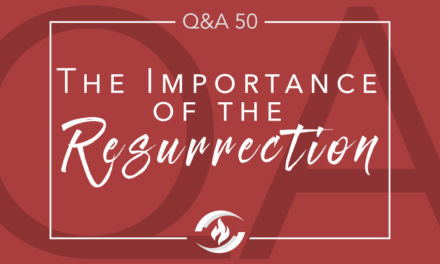Q.
Brother John,
Could you explain what it means to worship the Lord in spirit and in truth (John 4). These are obviously key in the worship of the living God. In the application how does this apply to the progressive “christian” worship that many promote today, and how should this encourage true worship in our Fundamental churches?
I look forward to the insight you draw from God’s Word.
Paul
A.
Hello Bro. Paul,
Thanks for your relevant question! I love the passage you cited from John 4:24, “God is a Spirit: and they that worship him must worship him in spirit and in truth.” The combination of “spirit” and “truth” here is the key. “Worship” gives God the worth that is due Him. This involves so much more than what we call “Worship Services.” But let’s go ahead and address “worship” as it is often used in our modern context, and do so in relation to the Spirit and to truth.
The truth without the Spirit is dead orthodoxy. The Spirit without the truth is unorthodoxy (and is not the Spirit). But the Spirit and the truth is living orthodoxy!
That which makes man different from the animals is the spirit dimension. Children of God possess a regenerated human spirit consisting of the nature of God implanted into them (Eph. 4:24; 1 John 3:9) where the Spirit of God indwells them. This is where true worship begins. Therefore it is sourced in the indwelling Spirit communing with the regenerated spirit, working out through the soul and the body. All of this must be in accord with truth, for the Spirit of truth always works within the boundaries of the Word of truth.
Today there seems to be two extremes in worship styles: Deadness in the name of truth, and counterfeit in the name of the Spirit. How do we keep from these two counterproductive extremes and truly worship in “spirit and in truth”? Let’s address two considerations.
First, we must recognize the difference between God-ordained absolutes and God-ordained variables within the absolutes. God made some things black and white, and God chose to leave other matters less clear. The absolutes are matters made clear in the written Word. This provides what we might describe as a plateau of objective truth. The variables are applications made clear by the leading of the Spirit of God within the plateau of truth. They are like guardrails to protect the truth in our lives. But they may differ from person to person on the plateau.
In the matter of worshipping “in spirit and in truth,” the absolutes represent the truth, and the variables represent our spirit yielded to the Spirit’s leadership within the absolutes. In other words the absolutes involve the objective “truth,” and the variables within the absolutes involve “the Spirit” to guide us where matters are not objectively clear. If everything was black and white, we would not need the Holy Spirit.
Compromisers make absolutes variable. Legalists make variables absolute. Both are wrong. Of course, some debate what’s absolute and what’s variable.
“Conservatives” sometimes err by conserving traditions in the name of conserving truth. While traditions have value, this error lacks the real leading of the Spirit, since over time the Spirit may change some applications, always, of course, within the plateau of absolutes. For example, some choose to hold to a particular time period of musical sound, and mistakenly think that is the only application of truth legitimately possible. Others choose one genre of sound and condemn everything else. Yet there are other legitimate applications that are different, but not worldly.
“Progressives” sometimes err by actually not progressing at all, but rather digressing into worldliness in the name of the Spirit. But the Spirit never violates the Word and thus will not lead us to indulge the flesh (Gal. 5:16-23), to conform to the world (Rom. 12:2), love the world (1 John 2:15-17), or be the enemy of God through friendship with the world (James 4:4). The question is not “What harm is there in this?” but “What does God want me to do?”
A second consideration involves seeing the distinction between individual soul liberty and the need for individual church unity. Soul liberty, or what some call the priesthood of the believer, is the Bible truth that each Christian possesses his or her own relationship with God through the Spirit and does not have to go through a man. “There is…one mediator between God and men, the man Christ Jesus” (1 Tim. 2:5). Absolutes are absolute for all, but the variables are what we often call “preferences.” But they are really the Holy Spirit’s preferences for us, not our own desires. The Spirit knows what application each believer needs to safely keep him on the plateau and protect him from going off the cliff into compromise, or in some cases where you need to draw a line of application so as not to stumble someone you influence. Each believer has the soul liberty to follow the Spirit in these variable matters.
Yet churches have platforms, leadership positions, music ministry, and so forth. Who should make the decisions for how matters are applied in the church ministry setting? The one who will answer to God for these decisions whether he makes them or not—the pastor. Here those within that flock need to defer to their pastor. This is for the sake of individual church unity. It does not mean they have to agree for their personal lives. Just as leaders must allow for individual soul liberty, individuals must allow for individual church unity—all within the absolutes of Scripture.
John
We’d love to hear your thoughts on this subject in the comments section below! If you have a question on another subject, we welcome you to make a submission by clicking here:












Watchman Nee in his book, The Release of the Spirit, suggests that our human spirits united with Christ’s Spirit after salvation, must be separated from our souls ie. the “outer-man” (the place of our intellect, will and emotion) in order for our unified spirit to be released in power to work to the benefit of the individual and the church. To the extent our outer man/soul is not broken the spirit is hindered. Oh that we may see truer and more complete worship as the outer-man is broken and we become conformed to the image of Jesus Christ and experience… Read more »
Well put. Nee’s book is so helpful on this.
Extremely well put and helpful. Thank you, Brother Van Gelderen.